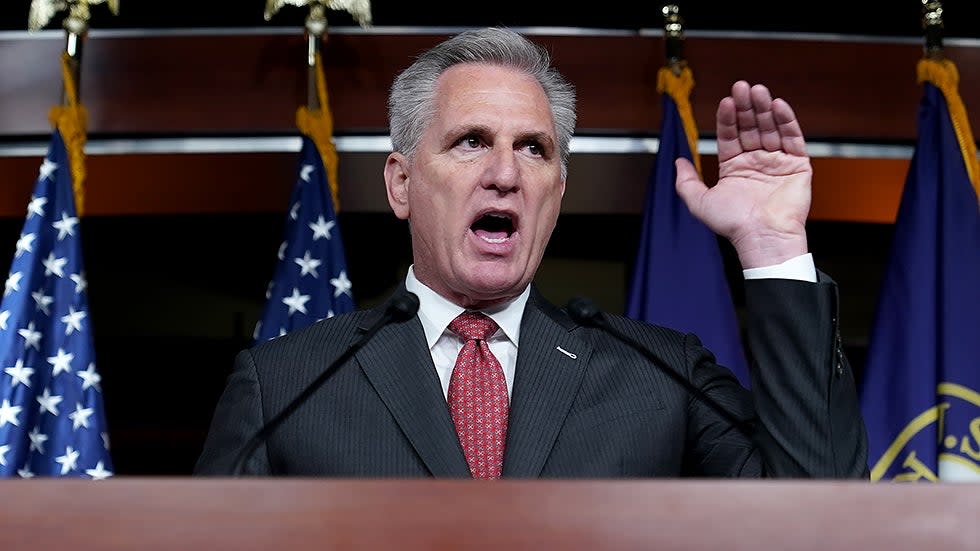Kevin McCarthy is hostage to the GOP's 'exotic wing'

- Oops!Something went wrong.Please try again later.
- Oops!Something went wrong.Please try again later.
House Minority Leader Kevin McCarthy (R-Calif.), is a weathervane, constantly changing his behavior to remain in alignment with the partisan political winds. To achieve his one and only goal - becoming Speaker of the House - McCarthy has become hostage to Donald Trump and what used to be regarded as "the exotic wing" of the Republican Party.
In January 2019, a few months after the Democrats gained 40 seats in the House - many of them in suburban and demographically diverse districts - Rep. Steve King (R-Iowa) wondered, "White nationalist, white supremacist, Western Civilization - how did that language become offensive?" Declaring that King's views did not represent the party of Lincoln and were "definitely not American," McCarthy removed him from the judiciary and agriculture committees.
In February 2021, two weeks after Trump left the White House, McCarthy was less sure which way the political winds in the GOP were blowing. Having claimed in 2020 that "there's no place for QAnon in the Republican Party," McCarthy now said, "I don't even know what QAnon is." McCarthy stated that Rep. Marjorie Taylor Greene's (R-Ga.) assertion that Nancy Pelosi (D-Calif.) was guilty of treason, a crime punishable by death, and her conspiracy theories about staged school shootings and wildfires set by Jews with space lasers "do not represent the values or beliefs of the House Republican Conference." Although he maintained that "we hold our members to a high standard," McCarthy opposed removing Greene from the budget panel and education and labor committee - and promised she might get "better ones" if the Republicans are returned to power and he's in charge.
Buoyed by President Biden's sagging poll numbers and Republican gains in off-year elections in Virginia and New Jersey, McCarthy now seems confident that his party will regain control of the House in 2022. He realizes, of course, that he needs the votes of everyone on his side of the aisle to become Speaker.
And so, when Rep. Paul Gosar (R-Ariz.) posted a photoshopped anime video to his Twitter and Instagram accounts in which he kills Rep. Alexandria Ocasio-Cortez (D-N.Y.) and attacks President Biden, McCarthy vehemently opposed censure for Gosar. In fact, McCarthy promised to award Gosar, as with Greene, with other - perhaps "better" - committee assignments. Last week, Rep. Lauren Boebert (R-Colo.) described an alleged encounter in an elevator with Rep. Ilhan Omar (D-Minnesota), one of three Muslims in Congress, in a way that portrayed Omar as a potential Jihadist suicide bomber. Rep. Nancy Mace (R-S.C.) blasted the "disgusting" racist trope. From McCarthy ... crickets.
Nor should we forget McCarthy's about face on the Jan. 6 assault on the U.S. Capitol.
At first, he acknowledged what we all saw and knew: "The president bears responsibility for Wednesday's attack on Congress," McCarthy declared on the floor of House. "He should have immediately denounced the mob when he saw what was happening." McCarthy maintained there was "absolutely no evidence" that Antifa planned the attacks: "Conservatives should be the first to say so."
"Let's be clear," he concluded, "Joe Biden will be sworn in as president of the United States in one week, because he won the election."
In February, however, as Trump's hold on the Republican base and the party apparatus became apparent, McCarthy visited Mar-a-Lago to kiss the former president's ring. In July, he walked back his claim that Trump bore responsibility for Jan. 6; instead, he accused Speaker Pelosi of ignoring advance warnings and refusing to seek assistance from the National Guard. By November, he was chastising the Nobel Prize committee for failing to award the Peace Prize to Trump.
McCarthy initially designated Rep. John Katko (R-N.Y.) to negotiate with Democrats to create a bipartisan commission to investigate the insurrection at the Capitol. The Democrats accepted McCarthy's demands - a 10-member panel, evenly divided between Democrats and Republicans; subpoenas issued only if the chair and vice chair (or a majority of members) agreed; and a final report produced by Dec. 31, 2021. Katko called the draft agreement "solid and fair."
But after Trump told Republicans not to fall into "the Democrat trap," McCarthy - who had just gotten rid of Rep. Liz Cheney (R-Wyo.) as third-ranking Republican leader in the House, despite her 95 percent lifetime rating from the American Conservative Union - threw Katko under the bus. McCarthy refused to accept the bipartisan commission unless it also investigated racial protests, a car attack on the Capitol, and a 2017 shooting of GOP lawmakers during a baseball game in Alexandria, Va.
As he should have known, the weathervane has not secured the support of the extremists he has been cultivating.
"I don't respect him at all," Greene said recently of McCarthy: "Many of us are very unhappy." Greene wants McCarthy to throw Cheney and Rep. Adam Kinzinger (R-Ill.) out of the Republican Party and take away committee assignments from any House Republicans who voted for the infrastructure bill. Mark Meadows, former leader of the Freedom Caucus and Trump's chief of staff, has given McCarthy a grade of D for "throwing in the towel" when Republicans have Democrats "on the ropes." Meadows suggests that Trump be voted the next Speaker if Republicans take control.
McCarthy may in fact get his wish and become Speaker in January 2023. If he does, we may - or may not - find out what, if anything, he stands for.
Glenn C. Altschuler is the Thomas and Dorothy Litwin Professor of American Studies at Cornell University. He is the co-author (with Stuart Blumin) of "Rude Republic: Americans and Their Politics in the Nineteenth Century."

